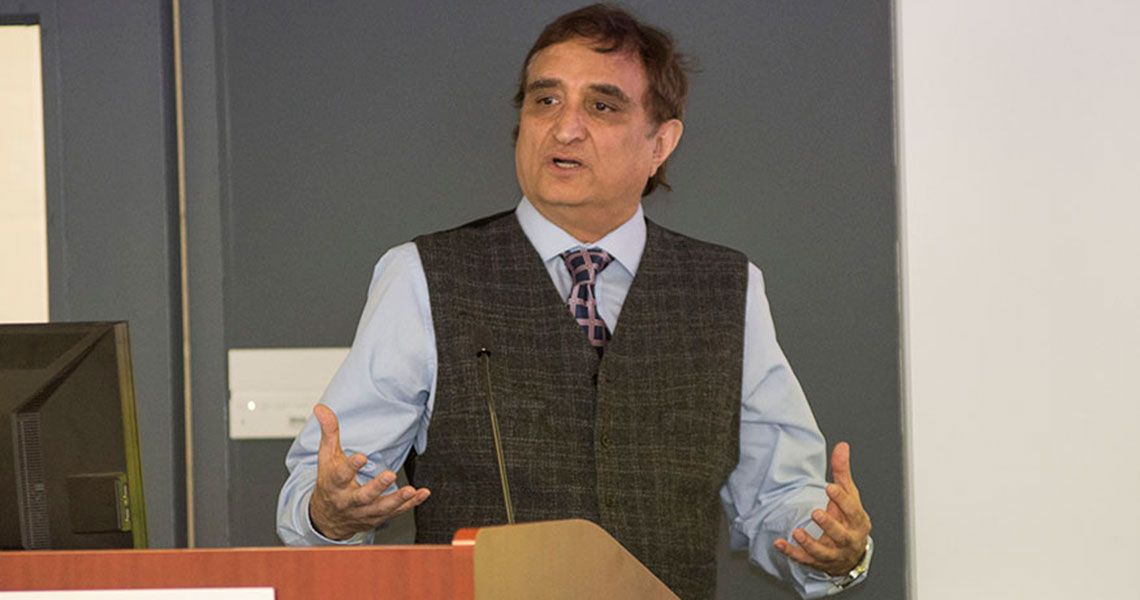The George Washington (GW) University School of Medicine and Health Sciences (SMHS) honored two faculty members who have made outstanding contributions to medical science research during the 2016 Faculty Research Awards on Nov. 7.
In previous years, such awards were handed out during GW Research Days. However, SMHS wanted to “make a little bit more of the successes of our faculty,” said Robert Miller, Ph.D., senior associate dean for research, Vivian Gill Distinguished Research Professor, and professor of anatomy and regenerative biology at SMHS. “I think that this gives more of an impact to these particular awards, so congratulations to [our faculty members recognized],” he said.
The first award, the Distinguished Researcher Award, went to Imtiaz Khan, Ph.D., professor of microbiology, immunology, and tropical medicine at SMHS. The second award, the 2015 Elaine H. Snyder Cancer Research Award, went to Javad Nazarian, Ph.D. ’05, M.Sc. ’00, associate professor in the department of Integrative Systems Biology at SMHS and principle investigator at the Center for Genetic Medicine Research and Center for Cancer and Immunology Research at Children’s National Health System. (Children’s National).
Calling him a “real immunologist,” Miller said in his introduction of Khan that the researcher has been ahead of the curve throughout his career investigating toxoplasmosis, a disease that results from infection by the parasite Toxoplasma gondii.
It was clear as Khan took the stage how much his research, and the award, meant to him. “It’s very difficult to talk about 30 years of work, and I have been told I have 20 to 25 minutes,” he said, “but I’ll try my best to convey what I’ve been doing for all those 30 years.”
In 1986, Khan came to the United States from India, starting his research career at Dartmouth University before moving to GW in 2006. Khan studies how the immune response works against Toxoplasma gondii, an opportunistic infection. Humans are infected by a variety of means, such as eating raw or undercooked meat or vegetables, or coming in contact with oocysts in cat feces, Khan said.
About 22 percent of people in the United States are affected by toxoplasmosis. Healthy people are less likely to see observable symptoms from the disease, but for people who have weak immune systems, such as those with AIDs, the pathogen can be deadly.
Khan’s research has centered on the role CD8+ T-cells play in chronic toxoplasmosis. These particular T-cells help control chronic infection against Toxoplasma gondii. “In chronic infection, CD8+ T-cells are very critical because if you deplete CD8+ T-cells, there’s a possibility of reactivation [of the infection],” he explained.
Khan also works to understand the development and maintenance of CD8+ T-cell immunity and to identify the factors responsible for initiation of robust CD8+ T-cell immunity. Another ongoing study for Khan and his lab is on the role of the CD4+ T-cell. Exhaustion of CD4+ cells may lead to malfunctions in the CD8+ T-cells, Khan said.
After Khan’s talk, Miller again took the stage to hand off the 2015 Elaine H. Snyder Cancer Research Award to Nazarian. Miller said he was particularly pleased to be giving the award to Nazarian “not only because he is a GW alum … but he’s also a partner at the [Children’s National].”
Miller praised Nazarian’s work on molecular-based therapies for treating childhood brain tumors, emphasizing his multidisciplinary approach with neurosurgeons, neurologists, oncologists, and others.
After thanking Miller for the honor and opportunity to speak, Nazarian added that he always finds it a pleasure “to come back to GW.”
His research centers on pediatric diffuse intrinsic pontine glioma (DIPG), an aggressive tumor of the brainstem. There are about 300 cases of DIPG a year, he said, and it acts for about 10 percent to 15 percent of all pediatric central nervous system cancers. DIPG also has a 95 percent rate of morality, with most children dying within a year of diagnosis.
DIPGs are different in children than adults, he said. To better understand the differences, Nazarian studies epigenomics, which he says is both very simple and highly complicated.
“As you’re sitting right here, some of your phones could be updating their software,” he said to the event attendees. “That is an epigenomic that is changing, but you do not how it is actually done. We don’t get an email with an epigenomic data update on how a particular organ is changed.”
However, recently there has been much progress when it comes to the study of pediatric brain tumors and their genomic landscape, thanks to an increase in available specimens, he said. “Parents come up to us and told us ‘take the brain of my child and see what’s wrong with it and study it,’ ” Nazarian said.
In addition, the safety of pontine biopsies has grown, the outcome of which has led to a biorepository of hundreds of samples at Children’s National.
That biorepository will allow Nazarian and his colleagues to better answer questions including: What’s the nature of tumor geneity? Are they homogenous or heterogeneous?
Answering such questions and gaining a better understanding of the genomic landscape of DIPGs will allow for the development of targeted therapies for cancer, Nazarian said.



